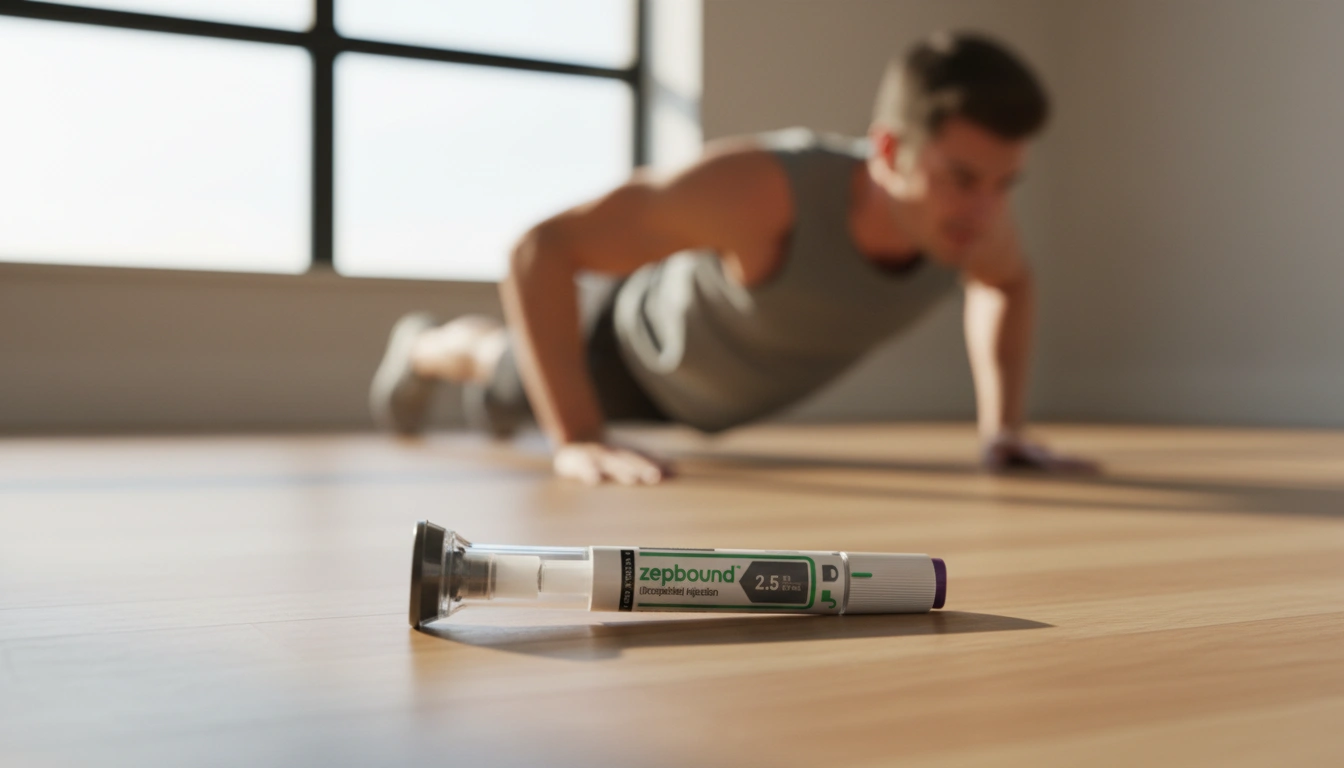Are Body Aches a Side Effect of Zepbound?

Imagine embarking on a weight loss journey, filled with hope and determination. You’ve taken the first step by consulting with your healthcare provider and have been prescribed Zepbound, a medication designed to assist in weight management. As you begin your treatment, you may experience a variety of side effects. One question that often comes up is: are body aches a side effect of Zepbound? This blog aims to explore the side effects associated with Zepbound, including whether body aches are common among users, and to provide insight into managing these side effects effectively.
Introduction
Weight management is a complex and often challenging endeavor. With the rise of obesity and related health conditions, the demand for effective weight loss medications has surged. Zepbound, a medication that utilizes the active ingredient tirzepatide, has gained attention for its efficacy in aiding weight loss for individuals with obesity or overweight conditions related to health issues. However, like any medication, Zepbound is not without its potential side effects.
Understanding the side effects of medications is crucial for anyone considering them as part of their weight loss journey. While some side effects are mild and temporary, others can be more serious and may require medical attention. In this blog, we will delve into the side effects of Zepbound, emphasizing body aches, their potential causes, and how to manage them. We will also explore how TrimRx’s personalized weight loss programs can support individuals in their weight management efforts, ensuring a safe and effective journey.
By the end of this post, readers will have a comprehensive understanding of Zepbound’s side effects, specifically regarding body aches and how they can be addressed. We will also highlight the importance of consulting healthcare professionals throughout the weight loss process.
Understanding Zepbound and Its Mechanism
Zepbound (tirzepatide) is a prescription medication specifically designed for weight loss in adults with a body mass index (BMI) of 30 or higher, or 27 or higher with weight-related medical conditions like type 2 diabetes. It works by mimicking the effects of hormones that regulate appetite and glucose metabolism, leading to reduced hunger and increased feelings of fullness.
The medication is administered through a subcutaneous injection, typically once a week, making it a convenient option for many individuals striving for weight loss. While Zepbound has shown promising results in clinical trials, it’s essential to recognize the range of side effects that may accompany its use.
Common Side Effects of Zepbound
When starting on Zepbound, individuals may encounter various side effects. While body aches can be concerning, they are one of many potential reactions to the medication. Here are some common side effects reported by users:
1. Gastrointestinal Issues
Many individuals experience gastrointestinal side effects when starting Zepbound. These can include:
- Nausea: Occurring in up to 29% of patients, nausea is one of the most reported side effects, especially during the initial phase of treatment.
- Diarrhea: Up to 23% of individuals may experience diarrhea, particularly when they first begin treatment.
- Constipation: Some users report constipation, with incidence rates around 17%.
These digestive issues often improve over time as the body adjusts to the medication.
2. Injection Site Reactions
As Zepbound is administered via injection, reactions at the injection site are common. Users may experience:
- Redness
- Swelling
- Pain or itching
These reactions typically resolve within a few days.
3. Fatigue and General Discomfort
Some patients report feelings of fatigue or general discomfort, which can sometimes be described as body aches. This feeling can be attributed to several factors, including the body adjusting to a new medication, changes in appetite, and variations in diet and activity levels. While fatigue is not a direct side effect of Zepbound, it can occur as a secondary response.
4. Body Aches
While body aches are not listed as a primary side effect of Zepbound, some individuals may experience muscle discomfort or joint pain. This can be due to several reasons:
- Changes in Physical Activity: As individuals begin to lose weight and become more active, muscle soreness can occur.
- Fluid Retention: Changes in fluid levels in the body can lead to temporary discomfort or aches.
- Dehydration: If gastrointestinal side effects like diarrhea or vomiting lead to dehydration, muscle cramps or aches can result.
If body aches persist, it’s important to consult with a healthcare provider.
Serious Side Effects of Zepbound
While most side effects of Zepbound are manageable, it’s crucial to recognize the more serious potential side effects. These include:
1. Risk of Thyroid Cancer
Zepbound has a boxed warning for the potential risk of thyroid cancer, specifically medullary thyroid carcinoma (MTC) based on animal studies. Individuals with a history of thyroid cancer should discuss alternative treatments with their healthcare provider.
2. Pancreatitis
Although rare, Zepbound may cause severe inflammation of the pancreas (pancreatitis). Symptoms include severe abdominal pain, persistent nausea, and vomiting. If these symptoms occur, it’s vital to seek medical attention immediately.
3. Kidney Injury
Severe gastrointestinal side effects can result in dehydration, leading to kidney problems. Symptoms of kidney injury may include reduced urine output, dark-colored urine, and swelling in the legs or ankles.
4. Allergic Reactions
Though rare, some individuals may experience severe allergic reactions. Symptoms may include hives, swelling of the face or throat, and difficulty breathing. Immediate medical attention is necessary in such cases.
Managing Side Effects
Understanding how to manage side effects while taking Zepbound is critical for ensuring a successful weight loss journey. Here are some strategies:
1. Communicate with Your Healthcare Provider
Before starting Zepbound, it’s essential to have an open discussion with your healthcare provider about your health history and any potential risks. If you experience side effects, report them promptly. Your healthcare provider can adjust your dosage or suggest alternative treatments as necessary.
2. Gradual Dose Adjustment
To minimize side effects, your healthcare provider will typically start you on a lower dose of Zepbound and gradually increase it. This approach allows your body to adjust to the medication more comfortably.
3. Hydration and Nutrition
Staying hydrated is crucial, especially if you experience gastrointestinal side effects. Drinking plenty of fluids can help mitigate the risk of dehydration and its related symptoms. Additionally, adopting a balanced diet rich in fruits, vegetables, whole grains, and lean proteins can support overall health and help manage side effects.
4. Monitor Your Activity Levels
As you begin to lose weight and increase your physical activity, listen to your body. If you experience muscle soreness or body aches, consider adjusting your exercise routine to prevent overexertion. Incorporating rest days and low-impact exercises can aid recovery.
5. Consider TrimRx’s Supportive Programs
At TrimRx, we understand that each individual’s weight loss journey is unique. Our personalized weight loss programs offer comprehensive support, including medical consultations and tailored treatment plans designed to address your specific needs. Taking our free assessment quiz can help determine if you qualify for our prescription weight loss medications, including Zepbound, and receive personalized guidance from our team.
Conclusion
Navigating the world of weight loss medications can be challenging, especially when faced with potential side effects. While body aches are not a commonly reported side effect of Zepbound, they can occur due to various factors associated with the medication and lifestyle changes. Understanding the overall landscape of Zepbound’s side effects, including how to manage them effectively, empowers individuals to make informed decisions about their weight loss journey.
As you embark on this path, remember that seeking support from healthcare professionals is essential. At TrimRx, we are dedicated to helping you achieve your weight loss goals through safe, effective, and personalized care. If you’re considering Zepbound or other weight loss medications, we encourage you to take our free assessment quiz here to explore your options and begin your journey with confidence.
FAQs
Are body aches a common side effect of Zepbound?
Yes, body aches are a recognized side effect of Zepbound, occurring in approximately 5–10% of patients during treatment. TrimRx helps patients understand that body aches can occur with Zepbound and distinguishes between medication-related discomfort and other causes.
Why do I have body aches on Zepbound?
Body aches from Zepbound may result from rapid metabolic changes, dehydration, or muscle adaptation during weight loss. TrimRx explains the physiological reasons behind body aches associated with Zepbound and helps identify whether symptoms stem from the medication or other factors.
When do body aches start as a Zepbound side effect?
Body aches typically begin within 24–72 hours after injection as a Zepbound side effect, often coinciding with peak medication levels. TrimRx tracks when body aches emerge during treatment to help patients anticipate and manage these symptoms effectively.
How long do Zepbound body aches last?
Body aches from Zepbound generally last 2–4 weeks as your body adjusts to the medication. TrimRx monitors symptom duration to determine whether body aches fall within the expected adjustment period or require medical follow-up.
Can body aches from Zepbound be prevented?
While it’s difficult to fully prevent body aches from Zepbound, staying hydrated and maintaining proper protein intake can reduce their severity. TrimRx provides nutritional and lifestyle strategies to help minimize this side effect.
What helps relieve body aches from Zepbound?
Relieve Zepbound-related body aches through gentle stretching, consistent hydration, magnesium supplementation, or over-the-counter pain relievers. TrimRx recommends personalized relief strategies based on your symptom intensity and overall health profile.
Are Zepbound body aches serious?
Most Zepbound-related body aches are mild and not serious. However, persistent or severe pain should be evaluated by a healthcare professional. TrimRx helps patients determine whether aches represent normal adaptation or warrant medical attention.
Do body aches mean Zepbound is working?
No, body aches don’t indicate medication effectiveness. Zepbound works through metabolic pathways, not muscle discomfort. TrimRx clarifies that while body aches can occur during treatment, they aren’t a sign of progress or treatment success.
Should I reduce my Zepbound dose if I have body aches?
Only consider dose reduction if body aches are severe or persistent despite management. TrimRx evaluates whether dose adjustments are necessary or if symptoms can be controlled through supportive care measures.
Will body aches go away if I stay on Zepbound?
Yes, body aches typically resolve within 4–8 weeks as your body adapts to Zepbound. TrimRx reassures patients that this side effect usually improves over time without requiring discontinuation of treatment.
Can electrolyte imbalances worsen muscle discomfort?
Yes, low levels of sodium, potassium, or magnesium can intensify muscle aches during treatment. Testing and correcting deficiencies often helps relieve discomfort and support overall well-being.
Does rapid weight loss itself cause muscle soreness?
Rapid weight reduction can trigger temporary muscle adaptation as your body adjusts to changes in body composition and movement patterns. This process may independently contribute to mild soreness apart from the medication.
Can I use heating pads or ice for muscle pain relief?
Yes, both heat and ice can help, depending on your symptoms. Heat relaxes tight muscles, while ice reduces inflammation. Experiment to determine which provides better relief for your specific discomfort.
Should I modify my exercise routine if experiencing muscle aches?
Yes, temporarily reduce exercise intensity while maintaining light activity to prevent stiffness. As your symptoms improve, gradually return to normal activity levels while listening to your body’s cues.
When should muscle aches prompt me to contact my doctor?
Contact your doctor if muscle aches become severe, worsen over time, or are accompanied by dark urine or significant weakness. These could signal rare but serious complications that require prompt medical evaluation.

Transforming Lives, One Step at a Time
Keep reading
Zepbound Before and After: What Results to Expect
Zepbound (tirzepatide) produces some of the most dramatic before and after transformations of any weight loss medication available. Clinical trial data from the SURMOUNT-1…
Zepbound Results: How Much Weight Can You Lose in 3 Months?
Most people lose between 5% and 8% of their body weight during the first three months on Zepbound (tirzepatide). For someone starting at 250…
Navigating Your Path: How Many Doses Are In Zepbound and What It Means for Your Health Journey
Curious how many doses are in Zepbound? Discover its weekly dosing schedule, available strengths, and titration process for effective weight loss. Learn more!



